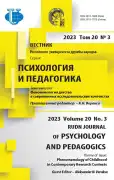A Group Level Analysis of Self-evaluations Associated with Cognitive Load
- Authors: Kouzalis A.1
-
Affiliations:
- HSE University
- Issue: Vol 20, No 3 (2023): Phenomenology of Childhood in Contemporary Research Contexts
- Pages: 578-587
- Section: DEVELOPMENT OF SELF-REGULATION: AGE SPECIFICS AND KEY FACTORS
- URL: https://journal-vniispk.ru/2313-1683/article/view/326149
- DOI: https://doi.org/10.22363/2313-1683-2023-20-3-578-587
- EDN: https://elibrary.ru/AJYYHJ
- ID: 326149
Cite item
Full Text
Abstract
Self-evaluation, or self-rating, is the process by which people evaluate themselves with the purpose of improving several aspects of their personalities or skills and it is closely related to the cognitive function of metacognition. The purpose of the study was to investigate the degree of implication of various brain areas to meta-cognition as it relates to subjective ratings of cognitive effort when performing mathematical problems of different complexity. To achieve this, participants were recruited to solve mathematical problems (addition, subtraction, multiplication, and division) in three levels of difficulty, while inside an fMRI scanner. After solving a given task, they were asked to evaluate the amount of effort they spent to solve it. Brain signal was collected during their answers, which was then analyzed with the aid of computer software. Results of the analysis show that increases in task difficulty activate the frontal lobe, cingulate and insular cortex areas. The parietal lobule, the precuneus and the cingulate gyrus were found to be active as well as during all four mathematical operations.
About the authors
Alexios Kouzalis
HSE University
Author for correspondence.
Email: alexiskouzalis@gmail.com
ORCID iD: 0000-0002-0986-7896
SPIN-code: 8038-5980
Scopus Author ID: 57223436261
doctoral student of the Doctoral School of Psychology
20 Myasnitskaya St, Moscow, 101000, Russian FederationReferences
- Adelman, G. (2009). Encyclopedia of neuroscience (M. D. Binder, N. Hirokawa & U. Windhorst, Eds.). Berlin: Springer; Heidelberg. https://doi.org/10.1007/978-3-540-29678-2
- Arsalidou, M., & Taylor, M.J. (2011). Is 2 + 2 = 4? Meta-analyses of brain areas needed for numbers and calculations. NeuroImage, 54(3), 2382-2393. https://doi.org/10.1016/j.neuroimage.2010.10.009
- Arsalidou, M., Pawliw-Levac, M., Sadeghi, M., & Pascual-Leone, J. (2018). Brain areas associated with numbers and calculations in children: Meta-analyses of fMRI studies. Developmental Cognitive Neuroscience, 30, 239-250. https://doi.org/10.1016/j.dcn.2017.08.002
- Baird, B., Cieslak, M., Smallwood, J., Grafton, S.T., & Schooler, J.W. (2015). Regional white matter variation associated with domain-specific metacognitive accuracy. Journal of Cognitive Neuroscience, 27(3), 440-452. https://doi.org/10.1162/jocn_a_00741
- Baird, B., Smallwood, J., Gorgolewski, K.J., & Margulies, D.S. (2013). Medial and lateral networks in anterior prefrontal cortex support metacognitive ability for memory and perception. The Journal of Neuroscience, 33(42), 16657-16665. https://doi.org/10.1523/JNEUROSCI.0786-13.2013
- Berlucchi, G. (2009). Chapter 13: The contributions of neurophysiology to clinical neurology: An exercise in contemporary history. In S. Finger, F. Boller & K. Tyler (Eds.), History of Neurology (vol. 95, pp. 169-188). Elsevier Science. https://doi.org/10.1016/S0072-9752(08)02113-1
- Chua, E.F., Schacter, D.L., Rand-Giovannetti, E., & Sperling, R.A. (2006). Understanding metamemory: Neural correlates of the cognitive process and subjective level of confidence in recognition memory. NeuroImage, 29(4), 1150-1160. https://doi.org/10.1016/j.neuroimage.2005.09.058
- D’Argembeau, A., Ruby, P., Collette, F., Degueldre, C., Balteau, E., Luxen, A., Maquet, P., & Salmon, E. (2007). Distinct regions of the medial prefrontal cortex are associated with self-referential processing and perspective taking. Journal of Cognitive Neuroscience, 19(6), 935-944. https://doi.org/10.1162/jocn.2007.19.6.935
- Fechir, M., Gamer, M., Blasius, I., Bauermann, T., Breimhorst, M., Schlindwein, P., Schlereth, T., & Birklein, F. (2010). Functional imaging of sympathetic activation during mental stress. NeuroImage, 50(2), 847-854. https://doi.org/10.1016/j.neuroimage.2009.12.004
- Fleming, S. M., & Dolan, R. J. (2012). The neural basis of metacognitive ability. Philosophical Transactions of the Royal Society B: Biological Sciences, 367(1594), 1338-1349. https://doi.org/10.1098/rstb.2011.0417
- Fleming, S. M., & Lau, H. C. (2014). How to measure metacognition. Frontiers in Human Neuroscience, 8, 443. https://doi.org/10.3389/fnhum.2014.00443
- Hankinson, R.J. (1991). Galen’s anatomy of the soul. Phronesis, 36(2), 197-233. https://doi.org/10.1163/156852891321052787
- Lokhorst, G.-J. (2005). Descartes and the pineal gland. Retrieved April 20, 2023, from https://plato.stanford.edu/archives/win2021/entries/pineal-gland
- Morales, J., Lau, H., & Fleming, S.M. (2018). Domain-general and domain-specific patterns of activity supporting metacognition in human prefrontal cortex. The Journal of Neuroscience, 38(14), 3534-3546. https://doi.org/10.1523/JNEUROSCI.2360-17.2018
- Rolls, E.T. (2006). Brain mechanisms of emotion and decision-making. International Congress Series, 1291, 3-13. https://doi.org/10.1016/j.ics.2005.12.079
- Sandrone, S., Bacigaluppi, M., Galloni, M.R., & Martino, G. (2012). Angelo Mosso (1846-1910). Journal of Neurology, 259(11), 2513-2514. https://doi.org/10.1007/s00415-012-6632-1
- Sedikides, C. (1993). Assessment, enhancement, and verification determinants of the self-evaluation process. Journal of Personality and Social Psychology, 65(2), 317-338. https://doi.org/10.1037/0022-3514.65.2.317
- Spalletta, G., Piras, F., Piras, F., Caltagirone, C., & Orfei, M. D. (2014). The structural neuroanatomy of metacognitive insight in schizophrenia and its psychopathological and neuropsychological correlates. Human Brain Mapping, 35(9), 4729-4740. https://doi.org/10.1002/hbm.22507
- Sridharan, D., Levitin, D.J., & Menon, V. (2008). A critical role for the right frontoinsular cortex in switching between central-executive and default-mode networks. Proceedings of the National Academy of Sciences, 105(34), 12569-12574. https://doi.org/10.1073/pnas.0800005105
- Sweller, J. (1988). Cognitive load during problem solving: effects on learning. Cognitive Science, 12(2), 257-285. https://doi.org/10.1207/s15516709cog1202_4
- Van der Meer, L., de Vos, A.E., Stiekema, A.P.M., Pijnenborg, G.H.M., van Tol, M.-J., Nolen, W.A., David, A.S., & Aleman, A. (2013). Insight in schizophrenia: Involvement of self-reflection networks? Schizophrenia Bulletin, 39(6), 1288-1295. https://doi.org/10.1093/schbul/sbs122
Supplementary files









